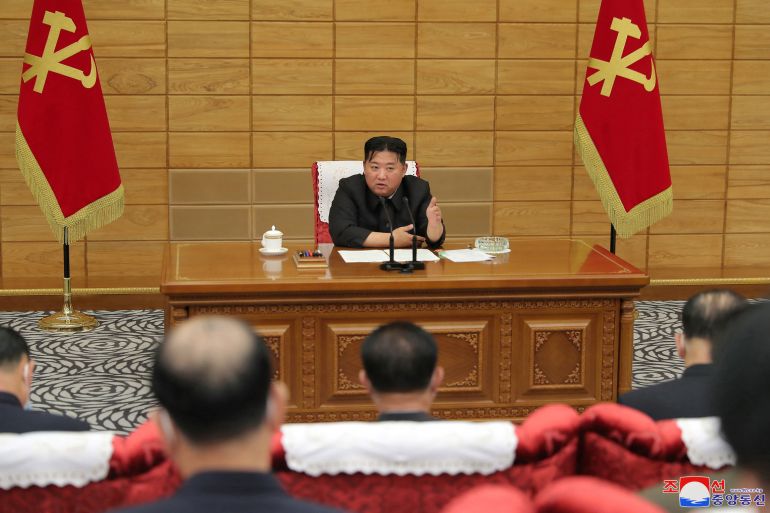North Korea escapes further sanctions as Russia, China wield veto
US expresses ‘disappointment’ after Security Council fails to tighten sanctions after slew of banned missile launches.

China and Russia have vetoed an effort to tighten United Nations sanctions on North Korea after a spate of missile launches this year, in the first split among the five veto-wielding permanent members of the UN’s most powerful body since it began sanctioning Pyongyang in 2006.
The remaining 13 council members all voted in favour of the resolution that was drafted by the United States and proposed banning tobacco and oil exports to North Korea. It would also have blacklisted the Lazarus hacking group, which the US says is tied to North Korea.
Keep reading
list of 4 itemsN Korea fires three missiles hours after Biden leaves Asia
Executions surge 20 percent in 2021 led by China, Iran: Amnesty
Biden, Yoon mull more military exercises amid N Korea tensions
A united Security Council imposed sanctions after North Korea’s first nuclear test explosion in 2006 and tightened them over the years in a total of 10 resolutions seeking – so far unsuccessfully – to rein in its nuclear and ballistic missile programmes and cut off funding. This year alone, the country has carried out a total of 23 missile launches, three of them in the space of less than an hour on Wednesday morning.
US Ambassador to the UN Linda Thomas-Greenfield described the vote as a “disappointing day” for the council.
“The world faces a clear and present danger from the DPRK (North Korea),” she told the council, using the country’s official name of the Democratic People’s Republic of Korea. “Council restraint and silence has not eliminated or even reduced the threat. If anything, DPRK has been emboldened.”
She said Washington had assessed that North Korea had carried out six ICBM launches this year and was “actively preparing to conduct a nuclear test”.
British, French and South Korean envoys voiced similar fears. Pyongyang last carried out a nuclear test in 2017.
“Using a veto protects the North Korean regime and gives it carte blanche to launch more weapons,” said the French ambassador, Nicolas de Riviere.
After vetoing further action, China and Russia told the Security Council that the US needed to improve dialogue with North Korea rather than opt for more sanctions.
The two countries have been pushing for sanctions to be eased on humanitarian grounds.
“The introduction of new sanctions against the DPRK [North Korea] is a path to a dead end,” Russia’s UN Ambassador Vassily Nebenzia told the council. “We have stressed the ineffectiveness and the inhumanity of further strengthening the sanctions pressure on Pyongyang.”
China’s UN Ambassador Zhang Jun said additional sanctions against North Korea would only lead to more “negative effects and escalation of confrontation”.
“The situation on the Peninsula has developed to what it is today thanks primarily to the flip flop US policies and failure to uphold the results of previous dialogues,” he told the council.
Denuclearisation talks have been stalled since 2019 when a summit in Vietnam between North Korean leader Kim Jong Un and then US President Donald Trump collapsed without agreement.
President Joe Biden’s administration has repeatedly said it is willing to speak with North Korea without preconditions but that it will not make any “grand bargain“. Pyongyang, meanwhile, has shown little interest in working-level talks.
The UN General Assembly will now discuss North Korea in the next two weeks under a new rule requiring the 193-member body to meet every time a veto is cast in the Security Council by one of the five permanent members – Russia, China, the United States, France and the United Kingdom.